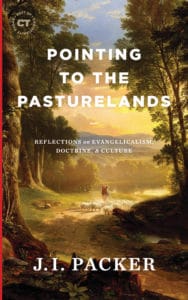
J. I. Packer was one of the most widely respected Christian writers of the twentieth century. Author of over forty books and named one of the most influential evangelicals by Time magazine and the readers of Christianity Today, Packer’s impact is immense. Now, in Pointing to the Pasturelands: Reflections on Evangelicalism, Doctrine & Culture, decades of Packer’s insights from his contributions to Christianity Today are combined in one volume.
Tony Reinke calls this collection of writings, “an indispensable volume for any Packer reader.” These lively and worshipful theological writings provide timeless insights from a man whose life was devoted to knowing God and making him known.
In this excerpt from Pointing to the Pasturelands, Packer reflects on how he wanted to be remembered.
How would you like to be remembered?” he asked me. “I mean, what would you like to be remembered as?” “Good question,” said I, playing for time (for I had not asked myself the question, and I don’t in any case carry snap answers to searching questions on the tip of my tongue); “how do you want to be remembered yourself?”
“As an encourager,” he said. (I am sure he will be: Barnabas should have been his middle name.) “But now, what about you?”
“As a voice,” I found myself telling him, “a voice that called people back to old paths of truth and wisdom.”
“Hum,” he said—or it might have been huh, or humph, or even ugh—“I think everybody ought to face that question, don’t you?”
“Yes,” I said, still wondering what he thought about my answer. He never told me, and maybe by now he has forgotten it. I haven’t forgotten it, however, and I have frequently wondered whether I ought to have said anything that sounds in retrospect so grandiose. But I still don’t think I could have said anything truer. If you asked me the same question today, honesty would require the same answer.
I was offsetting myself from two things that I have seen happen during the 47 years that I have been a Christian and a Christian watcher. Both are bound up with the emergence of the interdenominational animal called “the evangelical church.” Once, denominational identities were primary, interdenominational links were subsidiary, and parachurch ministries were small and few, none venturing to claim to be the church’s cutting edge. All this has been reversed in the current mindset that is the essence of “the evangelical church.” I do not suggest that this development is unhealthy—after all, it is a much-blessed, worldwide phenomenon. There are, however, two defects in it that I would like to be remembered for having called in question.
Defect one is the personality cult. Through travel, books, and the media, individuals become international household words, and then they are elevated to virtual infallibility. On issue after issue people reason thus: “Billy Graham / Martyn Lloyd-Jones / John Wimber / John Stott / Chuck Swindoll / Elisabeth Elliot / R. C. Sproul / (write in here your own preferred authority) says it; I believe it; that settles it.” This is a lapse from the Protestant appeal to Scripture into a more-than-papal traditionalism with which I would rather not be linked; I hope to be remembered as a “voice” (like John the Baptist, crying in the wilderness) encouraging people to think, rather than as a personality whose felt status and charisma stopped them thinking. (I am sure, incidentally, that all the victims of the personality cult I have mentioned feel the same, though they cannot do much about it.)
Defect two is the short memory. Denominational identity encourages believers to remember at least the denomination’s history, but belonging to “the evangelical church” of the late twentieth century seems to lead people to forget all Christian history, and live by moving from one “latest thing” to another. I, too, use my mind on some of these “latest things,” but what I live on is what I have learned from yesterday’s giants—Augustine, Bernard, Luther, Calvin, the Puritans, Whitefield, Wesley, Edwards, Spurgeon, Ryle—and these lessons constitute the “old paths of truth and wisdom” with which I try to acquaint “the evangelical church.” That is why my grandiose-sounding words came out as they did.
My friend’s question made me refocus on what I am here for. Discussions of biblical inerrancy, secular humanism, abortion, signs and wonders, women’s ordination, prophecy, and Christian healing have to be maintained, but they tend to be barren fields for the soul. I should like to be remembered as one who pointed to the pasturelands.
“I think everyone ought to face that question,” said my friend as we moved in to dinner. “I wish you’d write about it in CT.”
So I did. How would you like to be remembered?
Praise for Pointing to the Pasturelands
Some writers find it difficult to be boring; Jim Packer was one of them. How many evangelicals do you know who could (or would) write a column titled ‘It’s wrong to eat people’? Or there’s Jim avowing that he is God’s plumber and sewage man. I think I read every one of these pieces when they first appeared; I am grateful beyond words that this new format allows me to read them again.
—D. A. Carson, emeritus professor of New Testament, Trinity Evangelical Divinity School
There was—and is—no churchman and theologian from whom I have learned more about Christianity than Dr. Packer, who in life exemplified a model of orthodoxy and grace combined with an enviable gift for clarity. While many know him through his books, he also enjoyed influence as a writer of journalistic pieces for Christianity Today, where he brought his wit, wisdom, and faith to bear on a variety of issues. At once both a commentary on the times and explications of the faith, these shorter pieces are delightful, devotional gems.
—Carl R. Trueman, professor of biblical & religious studies, Grove City College
Years ago I bought access to Christianity Today’s digital archive simply to harvest the best of J. I. Packer’s columns and articles. The painstaking work yielded bushels beyond what I expected—nearly six decades of gold. But if I were a more patient man, I could have just waited for this collection, an indispensable volume for any Packer reader.
—Tony Reinke, journalist, and author of Newton on the Christian Life: To Live Is Christ
This valuable collection of the late Jim Packer’s essays in Christianity Today reveals a man who was often insightful, occasionally whimsical, and always deeply personal. Readers will discover his opinions on a wide range of subjects and quarry this volume for quotes and illustrations they can use in their own ministries. A valuable resource that will keep its author’s name alive for the next generation and beyond.
—Gerald Bray, research professor of divinity, Beeson Divinity School
This post is adapted from Pointing to the Pasturelands: Reflections on Evangelicalism, Doctrine & Culture by J. I. Packer (Lexham Press, 2021).







